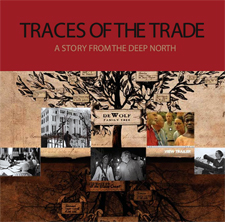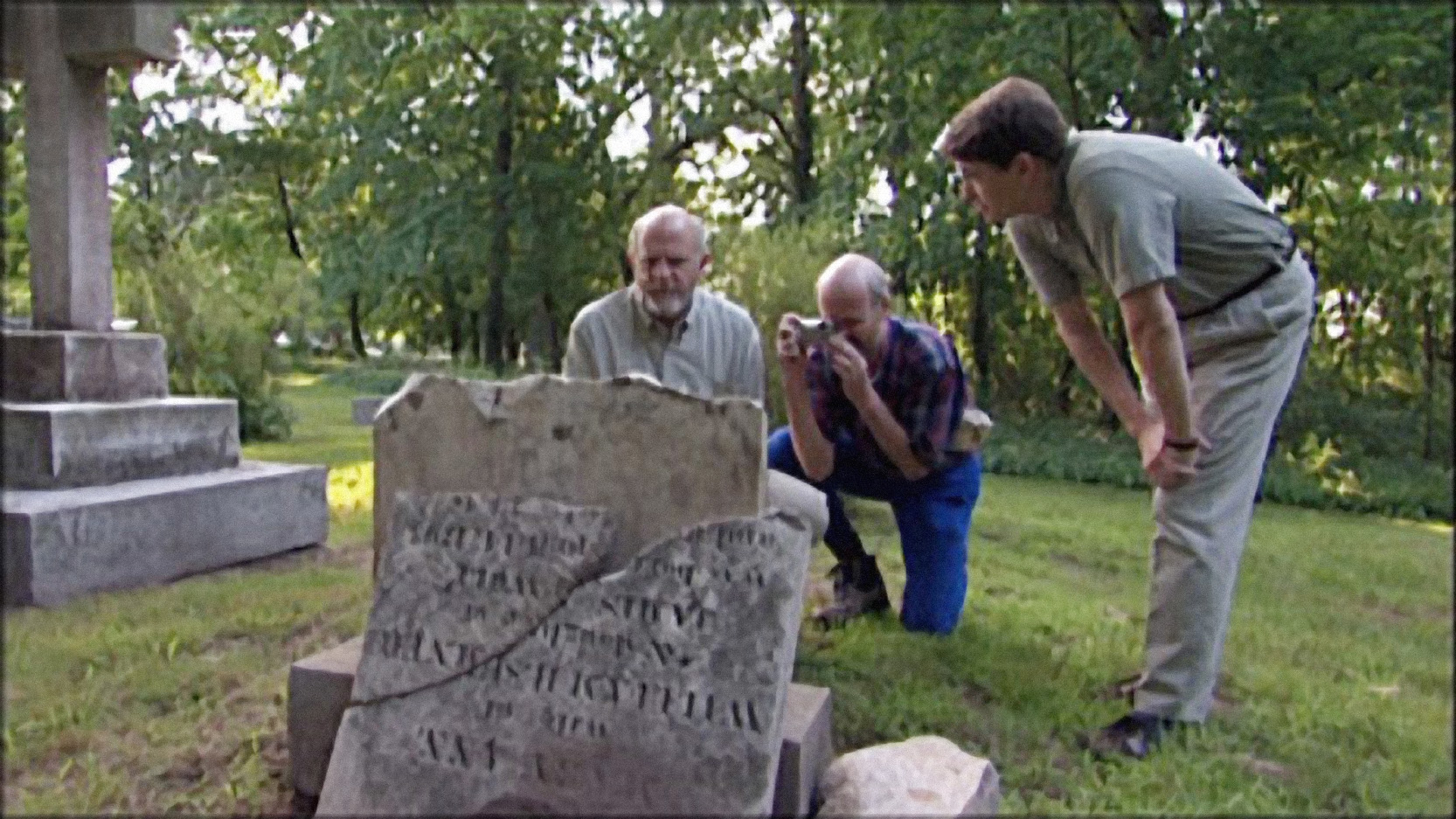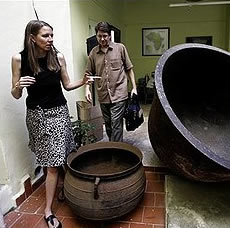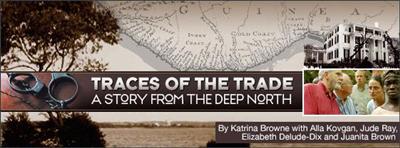
From PBS -- Traces of the Trade is unique and disturbing journey of discovery into the history and "living consequences" of one of the nation's most shameful episodes — slavery. In this bicentennial year of the U.S. abolition of the slave trade, one might think the tragedy of African slavery in the Americas has been exhaustively told. Katrina Browne thought the same, until she discovered that her slave-trading ancestors from Rhode Island were not an aberration. Rather, they were just the most prominent actors in the North's vast complicity in slavery, buried in myths of Northern innocence.
Browne — a direct descendant of Mark Anthony DeWolf, the first slaver in the family — took the unusual step of writing to 200 descendants, inviting them to journey with her from Rhode Island to Ghana to Cuba and back, recapitulating the Triangle Trade that made the DeWolfs the largest slave-trading family in U.S. history. Nine relatives signed up. Traces of the Trade: A Story from the Deep North is Browne's spellbinding account of the journey that resulted.

As the film recounts, the DeWolf name has been honored over the generations in the family's hometown of Bristol, R.I., and on the national stage. Family members have been prominent citizens: professors, writers, legislators, philanthropists, Episcopal priests and bishops. If the DeWolfs' slave trading was mentioned at all, it was in an offhand way, with reference to scoundrels and rapscallions.
Then Browne's grandmother opened the door a crack. She wrote a DeWolf history booklet with a brief but pointed reference to the slave trade, which caused Browne to look deeper. What Browne learned, and the journey she undertook with other DeWolf descendants, retracing early America's infamous trade in rum, slaves and sugar, revealed secrets hidden in plain sight. Archival documents — from logs and diaries to detailed business correspondence, cancelled checks and sales records detailing a global economy — unsettle not just a family but also a nation's assumptions about its not-so-distant history.

Most of the relatives Browne invited to join her never responded. Some were against the effort, including one who felt he had never done anything to anyone and saw no reason why he should be implicated in the DeWolf history. But when the 10 DeWolf descendants, ranging from siblings to seventh cousins, came together, they found they formed an answer to their relative's objection. Several in the group — and everyone's father — are Ivy League graduates, except Tom DeWolf, whose father went to night school. (Tom's book about the trip, "Inheriting the Trade," is published by Beacon Press). The family's preponderance of elite alma maters showed that its privilege endures. The DeWolf slave fortunes were plowed into other, legitimate businesses, a pattern matched in the larger U.S. economy.
From this extraordinary family angle, Traces of the Trade sets out to plumb contentious questions: What is the full story of the northern slave trade? What responsibility does white America bear for the past wrongs and contemporary legacy of slavery? Why is it so difficult for black and white Americans to have this conversation? Intrepid, candid, intellectually engaged and, for better or for worse, "unfailingly Protestant and polite," Browne and her relatives set out to face the facts — and themselves.

The family gathers in Bristol, where the DeWolf name is writ large as traders and rum distillers whose entrepreneurship built the city. Traces of the slave trade are few, but include the gravestone of Adjua, an African woman who had been enslaved as girl. In 1803, she and a young boy, Pauledore, had been "given" as Christmas gifts by James D'Wolf (the spelling at that time) to his wife. They are hauntingly remembered in a family nursery rhyme.
Browne and her relatives fly to Ghana, where the old slave forts bring home crushing realities. They receive discomfiting lessons in the vividness of slavery's cruelty and injustice from contemporary Africans and African Americans on their own homecoming pilgrimages. They also learn that Adjua, whose grave they had visited, might have been born on a Monday, according to the West African tribes' tradition of naming children for their day of birth.

In Havana, where the DeWolfs either farmed out enslaved Africans to the sugar plantations they owned (which supplied their Bristol distilleries) or sold the slaves for large profits on the open market, Browne's group is nearly overcome by frustration and a sense of helplessness. Worn down by travel, tension, the accumulating weight of slavery's detailed brutality — and more antagonism than their good intentions led them to expect — they confront the questions that have been haunting them: How has their experience affected their views of the black/white divide in America? If they accept some responsibility for the "living consequences" of their ancestors' crimes, what can they do to make amends?
One "secret" excavated by Traces of the Trade is that the DeWolfs were not just participants in the slave trade — they were the largest slave traders in American history. This one family, whose name adorns the stained glass windows they donated to Bristol's St. Michael's Episcopal Church, brought over 10,000 African slaves to the Americas. Up to half a million of these Africans' descendants are alive today. Moreover, the DeWolfs conducted the trade over three generations, beginning in 1769, and well after it had been banned in the United States in 1808.

Another fact obscured by post-Civil War mythologies is that the entire Northeastern seaboard was deeply implicated in the trade right up to the war. The DeWolfs may have been the biggest slavers in U.S. history, but there were many others involved. The Triangle Trade sustained the growing economies of Northern seaports like Bristol. Locals may have thought of the DeWolfs as distillers and traders that supported ship-building, warehousing, insurance and other trades and businesses, but it was common knowledge that the basis for all this was the cheap labor and huge profits reaped from trafficking in human beings.
The efforts of group members to answer these questions with action form the film's dramatic denouement — while landing the questions right back in the laps of all Americans. The family comes home and dives head-on into the debate about reparations for slavery, interviewing leading spokespeople who are for and against this remedy, and inviting viewers into the question of how to create "repair." The film asks us to consider this from political, economic and an internal viewpoint: What would it take to repair our relationships and to move beyond the guilt, defensiveness, anger or fear that can trip us up?

"In Traces of the Trade, we wanted ask this question: What is our responsibility?" says Browne. "I'm less concerned with understanding the extreme inhumanity of my ancestors than with understanding the mundane, ordinary complicity of the majority of New Englanders who participated in a slave-based economy. That had more parallels to me and my family today: well-intentioned white folks who are still part of systems that do harm. It's important to roll up our sleeves to deal with what we all inherited from our country's history."
Traces of the Trade is an important historical corrective to America's view of slavery and its consequences, and a probing essay into divergent versions of a history that continues to divide black and white in America, North and South. (source: PBS)
Understand though that these co-pays do not
ReplyDeleteadd up towards your twelve-monthly deductible.
Natural depression carries its special underwriting risk.
My web page ... imprezy integracyjne
This is not new. Anyone who knows anything about US history knows that there was slavery in the Northern States and eventually it was abolished. I learned that in grade school in the 1970's
ReplyDelete